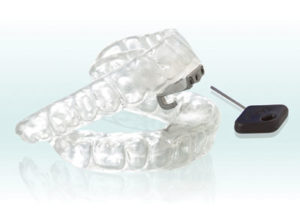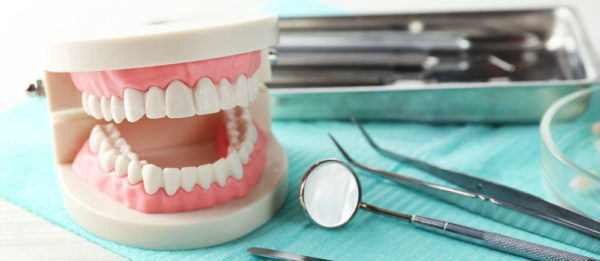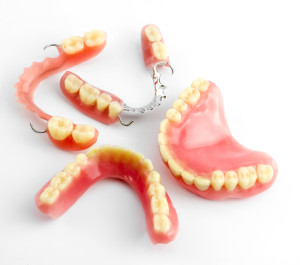Category Archives: Dentures
Wake UP, Gary!! Go Put in Your Mouthguard!!
 Have you ever had a night like that? Your dream turns into an unsettling adventure on a freight train. Only to be jolted awake and realize that it’s your husband snoring and the sound of the freight train is their snoring? Maybe he needs a mouthguard!
Have you ever had a night like that? Your dream turns into an unsettling adventure on a freight train. Only to be jolted awake and realize that it’s your husband snoring and the sound of the freight train is their snoring? Maybe he needs a mouthguard!
The reality of the situation is that HE isn’t getting a good night sleep either! Most likely Sleep Apenea is to blame. Sleep Apnea causes you to temporarily stop breathing during sleep and snoring is the side effect. These disturbances in your sleep can occur repeatedly and result in restless sleep and daytime drowsiness. Long term, Sleep Apnea can cause serious health issues including increased blood pressure and the restriction of oxygen to your brain and your blood stream.
Related Article: Having Trouble Sleeping? Talk to Your Dentist!
Now what? Dr. Gary Skrobanek at GPS Dental can help you BOTH get a good night sleep!
Will a Mouthguard will work?
By scheduling an initial consultation with Dr. Skrobanek and explaining your situation, he can work with you to recommend a dental appliance or mouthguard to wear at night that will alleviate the issue. A simple dental exam is all that needs to be done to figure out if you are a candidate for this treatment.
If so, Dr. Skrobanek can have a custom mouthguard made that fits over your maxilla and mandible (upper and lower jaw). The upper device hooks into the lower portion and enables the mandible to be pulled forward. You will be show how to use the dial mechanism to adjust the degree that the jaw needs to be held in a forward position so that it doesn’t fall open during the night causing your airway to collapse. By holding the mandible forward, the appliance (mouthguard) maintains a clear airway that improves breathing while you sleep and reduces snoring!
For more advanced cases of Sleep Apnea, a CPAP machine is the most effective treatment method; however, studies show that half of all CPAP patients cannot tolerate this type of therapy. Using a mouthguard type device is much less invasive and far more comfortable.
Related Article: Do You Hate Your CPAP Machine? Try this Simple Fix for Sleep Apnea.
Benefits of a Mouthguard:
- Alleviate Sleep Apnea without the need for surgery, a mask, or medication
- Improve Sleep
- Reduce Snoring
- Easy to Use
- Comfortable, Custom Fit
- Durable
What Causes Snoring?
According to the National Sleep Foundation, snoring is a problem that affects approximately 90 million Americans. Needless to say, many couples are going through the issue of one person being a very loud snorer.
Snoring is caused by the muscles in your throat and your tongue relaxing too much while sleeping, which causes the throat to become more narrow. The air going in and out of the throat then causes the characteristic sound of snoring. Snoring becomes more serious with age and is more common in overweight individuals and males.
Sweet Dreams…
Mouthguards or oral appliance therapy is covered by many medical insurance plans so this may come at little to no out-of-pocket cost to you. We’re happy to contact your dental insurance provider for you and have payment options available.
Give us a call and schedule your appointment today, so you AND your husband can get a good night sleep!
Dr. Gary P. Skrobanek and his experienced, friendly team at GPS Dental offer affordable family dentistry and gentle dental care in the San Antonio, TX area. Our office is conveniently located and offers early morning appointment times Monday through Friday to meet your needs. At GPS Dental, we provide most dental services, from family and general dentistry to dental implants, sleep apnea, TMJ / TMD Treatment, cosmetic dentistry and much more. We accept most dental insurance plans and offer affordable financial solutions for any budget. Call us at (210) 633-3477 to make an appointment.
The Stress-Free Guide to the Top 3 Tooth Replacement Options

Tooth replacement is a very personal process with a lot of variables. Healthy teeth and gums can change more than just the way you eat; your quality of life and overall happiness depend upon them. When replacing teeth, it’s important to know the differences between the methods and the pros and cons of each.
Luckily, the experts at GPS Dental have broken down the details of the most common teeth replacement options. The more you know, the easier your decision will be.
3 Ways to Replace a Tooth
The three types of tooth replacement are implants, bridges, and dentures. Each type is vastly different, and your specific needs must be taken into consideration for each. Take a look to determine which is your best tooth replacement option.
- Dentures replace the entirety of the upper or lower arch, including the teeth. They are completely and easily removable, and require regular cleaning. Though dentures have a bit of a reputation, the latest techniques and technology have made dentures feel more natural and comfortable.
Related Read: What I Wish I Knew Before I Got My Dentures
- Bridges also span the width of either the upper or lower arch. They are connected to one or two replacements on either side. The bridge connecting the two is bonded to the arch, itself. This replacement option isn’t removable, and the patient will need to be on the lookout for tooth deterioration around the bridge. On the other hand, dental bridges are less expensive than a full implant.
- Implants are the replacement of one or more teeth, completely and with no additional supports. They look, feel, and behave the same way natural teeth do, without the use of a bridge. An implant will allow you to eat any foods of your choosing, no problem. They are, however, the most expensive type of tooth replacement, requiring surgery and time to create a specialized crown to fit your mouth. Learn more about whether or not implants are right for you.
The type of tooth replacement that’s best for you depends upon a number of factors, including price and the overall health of your teeth and gums. It’s imperative that you consult with your dentist in all aspects of the replacement, as there are many aspects of your care that can make you a good or bad candidate for any of these options.
For more information about tooth replacement, why not schedule an appointment with GPS Dental? Just give us a call at (210) 633-3477, and our friendly staff will be happy to help you!
What I Wish I Knew Before I Got My Dentures
 Oftentimes, the mark of good dental work is that nobody can tell it happened. So, when you have questions about what it really feels like to have dental work done, you may not know who to ask! Today, the experts from GPS Dental are here to prep you for your first dentures.
Oftentimes, the mark of good dental work is that nobody can tell it happened. So, when you have questions about what it really feels like to have dental work done, you may not know who to ask! Today, the experts from GPS Dental are here to prep you for your first dentures.
Getting Dentures Takes a While
Getting dentures is not a quick process. Once you and your dentist have decided that dentures are the right course of action for you, you’ll need to have any problem teeth removed. After your mouth has fully healed from that procedure, you will begin the process of fitting your dentures, which usually takes somewhere around five visits. Your dentist may give you a temporary set of dentures, usually called a flipper, soon after your teeth are removed. This is not a permanent solution and is usually used for cosmetic reasons.
At GPS Dental, we offer the option for immediate dentures – so you walk out with your new teeth in place the same day. However, Dr. Skrobanek often needs to adjust these dentures in a follow-up visit, as your mouth will feel and fit differently after it has fully healed. Learn more about our denture options here.
You’ve Still Got to Visit Your Dentist
Your new teeth still need attention and care from your dentist. You’ll have to visit several times to get your dentures made and properly fitted. After that, we recommend checkups at least once or twice a year (the same recommendation we make for anyone else). However, each patient is different, and your dentist may recommend you come in more often.
Wondering when you should visit your dentist? Find out why we suggest you go before the end of the year.
Dentures Can Be Complete or Partial
Despite what cartoons may lead you to believe, dentures are not an ‘all or nothing’ sort of thing. When possible, it’s preferred to keep some natural teeth to help keep dentures in place and disperse the pressure on your jaw more naturally when chewing. Terms you might hear when discussing partial dentures, better known as ‘overdentures,’ include Nesbits (replacement molar teeth), and flippers (temporary dentures that are only used until permanent dentures are ready). Sometimes, partial dentures are cemented in place, known as bridges, and these require nearby natural teeth for support, while other partial dentures are completely removable.
Dentures Shouldn’t Be Uncomfortable
Advanced technology and knowledge means dentures today are better than ever. When you first get your dentures they may rub or irritate your gums, and this just means your dentist should adjust them. While your dentures might feel unusual or unnatural at first, they shouldn’t hurt you. Dentures are made to fit into your mouth, but every mouth is different and sometimes it takes a couple of tries to get your dentures fitted correctly. After all, your mouth is exceptionally sensitive, so small gaps can cause major discomfort.
It Takes Practice
Even with today’s advancements, dentures feel weird, and it may take a little while for you to get used to them. There’s a learning curve to everyday activities like eating. You might need to make adjustments in the beginning like, cutting food into smaller bites, for example. If you feel self conscious about speaking with your new dentures, just keep practicing (try talking to your pets or sing along to the radio). The muscles in your mouth will need to learn the difference in weight and spacing, minute as the changes may seem. Relax and give yourself time to figure it all out. Remember, if your dentures are constantly slipping or still irritating your mouth after a couple of weeks, visit your dentist to make sure they fit like they should!
Getting dentures can be a scary thought, but as with most fears, the more you know, the less frightened you’ll be. If you have any questions or concerns we didn’t answer, or if you’re looking for a dentist you can trust to walk you through getting your dentures, call Dr. Skrobanek with GPS Dental at (210) 633-3477.







